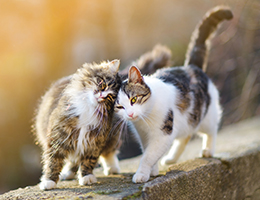
Dec. 12, 2019—Essential oils may sound like a natural, healthy thing to bring into any home. These fragrant plant oils are used to make homes smell better, and they're sometimes touted as remedies for conditions as varied as sore muscles, anxiety and nasal congestion.
But if you have cats, it's wise to be cautious about using them.
According to the American Society for the Prevention of Cruelty to Animals (ASPCA), essential oils can harm cats in some situations.
For example, some common essential oils—such as lavender, mint and lemon oils—are toxic for cats. When used in a fragrance diffuser, they can cause serious breathing problems.
Harmful oils diffused in the air can also collect on a cat's fur, which the cat may then ingest while grooming.
Protect your furry friend
If you want to use essential oils in your home, these five tips from ASPCA and the Texas A&M College of Veterinary Medicine & Biomedical Sciences can help protect your kitty:
1. Get a green light first. Don't use any essential oil in your home without an OK from your vet. Some vets may recommend pheromone diffusers (which use a similar device) to help treat behavior problems like urine marking. Talk with your vet about any concerns you have before using them with your pets.
2. Don't apply essential oils directly to your cat's skin or food. If a cat swallows an essential oil—or it's absorbed into the skin—it might cause a risky reaction. Highly concentrated oils are especially dangerous.
3. Take care with diffusers. Use them only for a short time in a room your cat can't get into. It may be best to avoid essential oil diffusers altogether if your cat has a history of breathing problems.
4. Paw-proof your diffuser. Even when it's not in use, keep it where your cat can't knock it over or be exposed to any oil.
5. Watch for warning signs. Possible symptoms of essential oil poisoning include:
- Respiratory distress (difficulty breathing, drooling, or watery eyes and mouth).
- Difficulty walking or wobbliness.
- Depression.
- Low body temperature.
- Vomiting and diarrhea.
- Seizures.
If there's any chance your cat has been exposed to a potential poison, call your vet or the ASPCA Animal Poison Control Center at 888.426.4435 right away.
While their use with cats has raised the most concerns, essential oils can cause problems for dogs and other animals too—especially birds. If you have birds at home, it's best to avoid diffusers altogether.